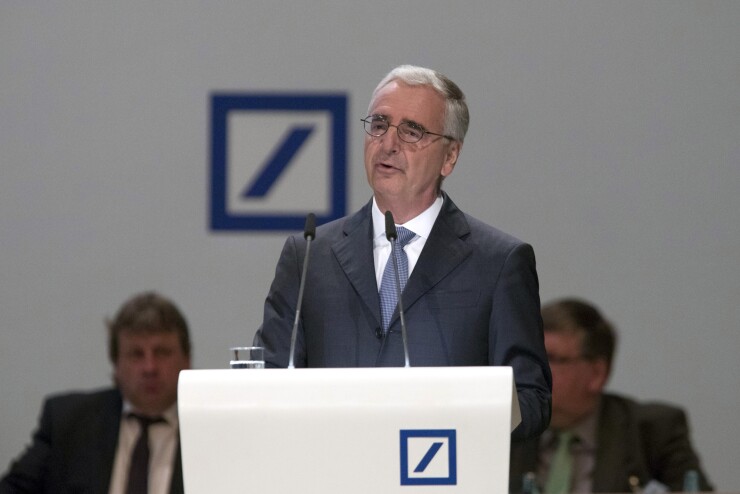Deutsche Bank is close to an agreement with former executives at Germany’s biggest bank to have them help pay for fines the lender suffered because of past misconduct.
The bank’s supervisory board “expects that in the coming months, there will be an arrangement which ensures that the individuals involved make a substantial financial contribution,” Chairman Paul Achleitner told shareholders Thursday at the annual meeting in Frankfurt.
Achleitner, 60, did not name any executives. He said discussions are at an “advanced stage,” though no definitive deal has been reached.

John Cryan, the current chief executive officer, has said previous management teams made the bank too complex and inefficient by putting short-term earnings ahead of Deutsche Bank’s long-term interests. The lender posted two consecutive years of losses, in part because of misconduct fines, and in January completed a $7.2 billion settlement with the U.S. over its handling of mortgage-backed securities before 2008.
Cryan, 56, took the top role in 2015, when co-CEO Anshu Jain stepped down, and ran the bank together with Juergen Fitschen before becoming sole CEO the following year. Jain helped build Deutsche Bank into Europe’s biggest securities firm under former CEO Josef Ackermann. In 2012, he became co-CEO, succeeding Ackermann, who in the course of a decade overhauled the management structure to centralize decision-making.
A cascade of bad news followed Jain’s appointment as he and co-CEO Fitschen worked to shore up the bank’s capital, cut costs and boost returns. The lender was probed for tax evasion in carbon markets, raided by the police and ordered to pay $2.5 billion for its role in rigging benchmark interest rates known as Libor.
Ackermann is among former executives in talks with Deutsche Bank about a potential financial contribution, according to a person with knowledge of the matter, asking not to be identified as the talks are private. Negotiations have been going on for over a year and it’s not yet clear how close Deutsche Bank and Ackermann are to an agreement, the person said.
Jain, 54, and Ackermann, 69, declined to comment through their spokesmen. Fitschen, 68, couldn’t immediately be reached.
Ackermann, CEO from 2002 until 2012, said last year he sees no legal basis for the company to force senior executives to return bonuses that have already been paid out.
“The question is whether parts that were not paid out can be released or left in the bank,” he said at the time. “I’ve demonstrated on multiple occasions that I’d be ready to show support for a bank which is in difficulty,” he said.
Achleitner, who became chairman the year Jain was named co-CEO, is seeking a second term at Thursday’s meeting. An internal probe by the bank last year cleared him of any wrongdoing in relation to the U.K.’s Libor probe, though some shareholder groups have backed a call for an external examination.
Shareholder Marita Lampatz in March added three proposals to the agenda for Thursday’s meeting, calling for an independent audit to examine behavior at the bank that led to fines in connection with the manipulation of interest rate benchmarks and alleged money laundering in Russia, as well as a fine for misleading the U.K.’s investigation of Libor rigging. A related proposal a year earlier was narrowly voted down.
“An enormous amount of investigation has been carried out, not only by us but also by our regulators. We investigated many problems intensively,” Cryan said Thursday. “I cannot imagine that further investigation of the same incidents will produce any substantial new findings.”




